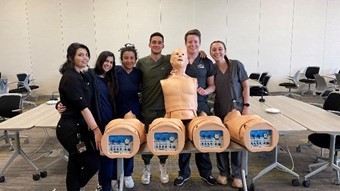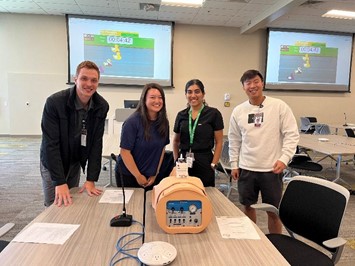Overdose Prevention Task Force Provides Naloxone Training Alongside The Developing Physician Basic Life Support Course
August 1, 2023

By Brooke Crosswhite, CHSU-COM Class of 2025
On July 26, 2023, over 150 first-year medical students at California Health Sciences University (CHSU) became the first class to undergo basic life support (BLS) training in conjunction with an innovative, opioid overdose simulation-based training led by CHSU’s Student Osteopathic Medical Association (SOMA) Overdose Prevention Task Force (OPTF).
The overdose training was created by several third-year OPTF members following identification of a need to increase overdose prevention education.
With the assistance of Dr. Grewal, OPTF members developed a didactic and hands-on session which allowed students to apply the BLS skills they acquired in The Developing Physician (TDP) course to an opioid overdose emergency scenario.
The session began with small group discussions on the pharmacology and side effects of opioids, in addition to how to respond to someone displaying opioid toxicity. Using a student-led model, OPTF members facilitated open discussions and welcomed questions from their peers.

During the hands-on portion, students were provided a scripted scenario about responding to an overdose. Based on their questions and examinations, OPTF group leaders responded with feedback about the simulated patient’s vitals and physical exam findings. Participants were encouraged to use their BLS skills to support the patient’s airway and administer naloxone using the provided naloxone training devices. Each student practiced these steps using the mannequins and were challenged with variations of the scene.
CHSU is one of the first osteopathic medical schools to adopt this unique approach to overdose prevention education. Using a model developed by CHSU’s OPTF, students are leading advances in BLS training by playing an active role in their medical learning experience. CHSU OPTF members intend to share their lesson plan with other medical schools as part of their mission to reduce overdose deaths and increase physician awareness throughout the country.